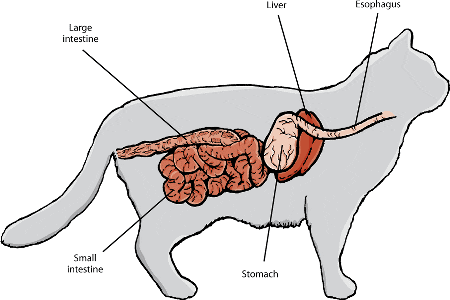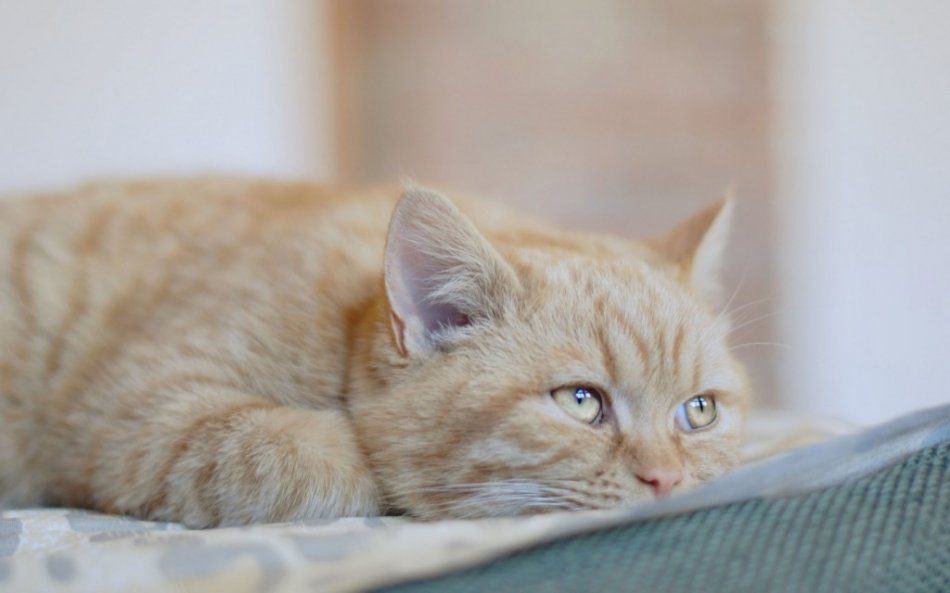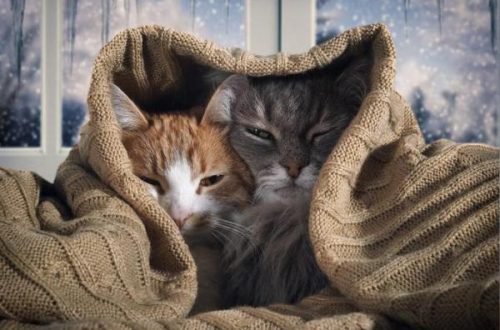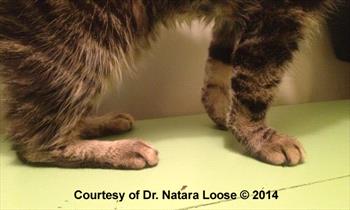
Diseases of the stomach and intestines in cats
Diseases of the gastrointestinal tract of cats are divided into non-infectious (constipation, tumors) and infectious (parasitic, viral and bacterial).


Contents
Inflammation of the colon in a cat
Symptoms of inflammation of the colon in a cat
- Diarrhea.
- Problems with defecation.
- Mucus in stool (sometimes bright red blood).
- Nausea (about 30% of cases).
- Sometimes weight loss.
Treatment of inflammation of the colon in a cat
First of all, contact your veterinarian. It will help to identify and eliminate the cause of the inflammatory process. Strictly adhere to the recommendations of the veterinarian. In some cases, it is enough to change the diet, but anti-inflammatory drugs may also be needed.
Constipation in a cat
In most cases, constipation is easy to manage. However, there are serious cases that are difficult to treat. Long-term constipation can be caused by intestinal obstruction, narrowing of the intestine from external problems, or neuromuscular problems of the colon.
Symptoms of constipation in a cat
- Difficulty in defecation.
- Dry, hard feces.
- Sometimes: depression, lethargy, nausea, loss of appetite, abdominal pain.
Treatment for constipation in a cat
- Consume more liquid.
- Sometimes, if the constipation is mild, switching the cat to a diet rich in fiber and providing constant access to water helps.
- Laxatives are sometimes used, but only a veterinarian can prescribe them.
- In severe cases, the veterinary clinic may remove the feces using an enema or other methods under general anesthesia.
- If constipation is chronic and does not respond to treatment, surgery may be performed to remove the affected part of the colon.
Self-medication is not worth it, since medicines that once helped you or your friends can be very dangerous for your cat!
It is a contagious disease associated with a virus and transmitted through close contact. The virus is transmitted through contaminated objects and through feces.
In kittens: fever, diarrhea, vomiting. Duration: 2 – 5 weeks. In adult cats, the disease may not show up externally. Remember that even if the cat recovers, it may remain a carrier of the virus. Infection can only be prevented by minimizing the contact of cats with feces.
There are no specific treatments. Supportive medications and, if necessary, fluid infusions are usually given.
Inflammation of the stomach (gastritis) in a cat
The cause of gastritis may be the ingestion of an object that violates the integrity of the mucous membrane.
Symptoms of inflammation of the stomach (gastritis) in a cat
- Nausea, which can cause weakness, lethargy, weight loss, dehydration, salt imbalance.
- If the gastritis is prolonged, food residues (for example, grass), blood or foam can be seen in the vomit.
- Diarrhea is often observed.
The prognosis depends on the causes of gastritis and the success of the treatment.
bowel cancer in cats
The disease is quite rare (about 1% of cancer cases in general). Most often, a cancerous tumor affects the large intestine in an elderly cat. The causes of the disease have not yet been precisely determined, but there is a version that the alimentary form of lymphoma can be caused by the feline leukemia virus. Intestinal tumors in cats are usually malignant and grow and spread rapidly.
Symptoms of bowel cancer in cats
Symptoms depend on the location and size of the lesion, but often include:
- Nausea (sometimes with an admixture of blood)
- Diarrhea (also with blood) or difficult bowel movements, constipation
- weight loss
- Pain in the abdomen
- Bloating
- Abdominal infections associated with bowel disease
- Sometimes – manifestations of anemia (pale gums, etc.)
Diagnosis includes a history of the disease, physical examinations, and biopsy of tissue samples. The preferred treatment is surgical removal of the tumor. The prognosis may be good or bad, depending on the type of tumor and the ability to remove it.
Obstruction of the gastrointestinal tract in a cat
Causes can be tumors, polyps, foreign objects, or overgrowth of stomach tissue. Partial or complete intestinal obstruction can occur.
Symptoms of obstruction of the gastrointestinal tract in a cat
- Decreased appetite
- Lethargy
- Diarrhea
- Nausea
- Pain when swallowing and in the abdominal region
- Increase or decrease in temperature
- Dehydration.
To diagnose the disease, the veterinarian must know everything about the cat’s diet, as well as whether there was access to needles, threads, small toys, etc. Palpation, ultrasound, X-ray or endoscopy is used.
Treatment of obstruction of the gastrointestinal tract in a cat
Intravenous fluids sometimes help. If the obstruction cannot be removed with an endoscope, surgery is necessary. It may also be required if the condition worsens suddenly and the cause is unknown. Many cats recover well after surgery.
cat intestinal ulcer
Ulcers are sores on the surface of the intestines or stomach caused by the influence of digestive enzymes or gastric juices. Reasons: the use of certain drugs, infections, tumors and a number of other diseases.
Symptoms of an intestinal ulcer in a cat
- Nausea (sometimes with blood)
- Abdominal discomfort that resolves after eating
- Whitening of the gums (this sign indicates anemia)
- Tar-like, dark stools are evidence of the presence of blood.
Diagnosis is carried out with the help of special tests, and to confirm the diagnosis, an x-ray or ultrasound is used. Biopsy of the intestines and stomach of the cat and endoscopy can also be used. It is extremely important to determine the cause of the disease in order to prescribe the correct treatment. Supportive care and a light diet are of great importance. Drugs are prescribed that reduce the acidity of the stomach and heal ulcers. Usually the duration of treatment is 6 – 8 weeks. It is good if it is possible to track the progress of treatment using endoscopy. If drugs do not help, biopsy samples from the small intestine and stomach are taken. If we are dealing with a peptic ulcer of the cat’s stomach or a benign tumor, the prognosis is good. If the ulcer is associated with liver or kidney failure or gastrinomas or gastric carcinoma – bad.
Inflammatory bowel disease in cats
Idiopathic inflammation is a group of diseases of the digestive system with persistent symptoms, but no clear cause. Cats of any gender, age and breed can get sick, but, as a rule, inflammation begins at the age of 7 years and older. Symptoms may come and go.
Symptoms of inflammatory bowel disease in cats
- Appetite changes
- Weight fluctuations
- Diarrhea
- Nausea.
Inflammation is difficult to diagnose, as similar symptoms can indicate many other diseases.
Treatment of inflammatory bowel disease in cats
The goal of treatment is to eliminate diarrhea in a cat, and, consequently, weight gain and a decrease in the inflammatory process. If the cause is identified (dietary disorder, drug reaction, bacterial overgrowth, or parasites), it must be eliminated. Sometimes changing the diet helps, sometimes it helps the treatment and makes it possible to reduce the amount of drugs or completely refuse them. The veterinarian sometimes recommends the use of hypoallergenic or eliminated feeds. As long as the pet is on this diet (at least 4 to 6 weeks), he should not take medication without the approval of a veterinarian. Often, inflammatory bowel disease can be controlled by combining medication and diet, but a complete cure is rarely achieved – relapses are possible.
Malabsorption in cats
Malabsorption in a cat is inadequate absorption of nutrients due to an abnormality in digestion or absorption, or both.
Symptoms of malabsorption in cats
- prolonged diarrhea
- Weight loss
- Change in appetite (increase or decrease).
Diagnosis can be difficult, as these symptoms can indicate different diseases. Laboratory tests may help.
Treatment of malabsorption in a cat
Treatment includes a special diet, treatment of primary diseases (if known) or complications. Anti-inflammatory drugs may be recommended.







